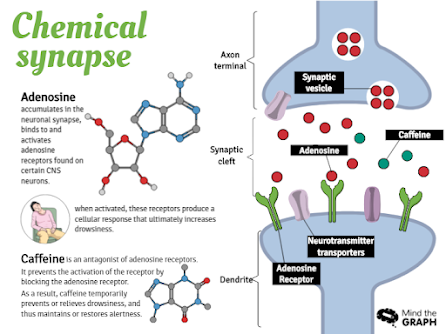Every year, around 100,000 metric tons of caffeine are consumed worldwide. This is the equal of 14 Eiffel Towers in weight. Caffeine is mostly found in coffee and tea, but it can also be found in sodas, chocolates, caffeine pills, and even decaf beverages.
Even if we haven't gotten enough sleep, caffeine makes us feel alert, focused, cheerful, and active. But it can also make us feel worried and spike our blood pressure. It is the most extensively used drug in the planet.
So how does it keep us awake?
Caffeine evolved in plants and performs a variety of functions. It is harmful to insects in high concentrations, as it is found in the leaves and seeds of some species. However, at little doses, such as those present in nectar, it can actually help them remember and revisit flowers. Caffeine functions as a stimulant for the central nervous system in humans. It keeps us awake by blocking one of the body's key sleep-inducing molecules, a substance called adenosine.
Your body requires a steady source of energy, which it obtains by breaking down ATP, a high-energy molecule. It liberates adenosine, the chemical backbone of ATP, during this process. This chemical has receptors that are properly matched to neurons in your brain. When adenosine binds to these receptors, it triggers a series of molecular events that cause neurons to fire more slowly and the release of critical brain signaling chemicals to slow.
 |
| Caffeine - Science behind it; Credit: Mind the graph |
To put it another way, you become sleepy. Caffeine is an antagonist of the adenosine receptor. By inhibiting adenosine receptors, it stops the process of slowing down your neurons. Caffeine and adenosine have a similar chemical structure that allows caffeine to bind to adenosine receptors but not enough to activate them.
To conclude, adenosine is a neuron inhibitor. Caffeine stimulates you by inhibiting the inhibitor.
Caffeine can also make you feel happier. Adenosine receptors are related to receptors for another chemical called dopamine in some neurons. Dopamine promotes pleasure as one of its functions in the brain. When adenosine binds to one of these paired receptors, it can make it difficult for dopamine to find its own home, interfering with its mood-lifting function. Caffeine, on the other hand, does not have the same effect as adenosine, and dopamine can take its place. Caffeine's actions on adenosine and dopamine receptors have been shown to have long-term advantages, lowering the risk of diseases like Parkinson's, Alzheimer's, and cancer.
Caffeine can also help the body burn fat more efficiently. In fact, several sports organizations believe caffeine offers sportsmen an unfair advantage and have imposed restrictions on its use. Olympic competitors had to maintain below a specified blood caffeine concentration to compete from 1972 through 2004. Of course, caffeine's effects aren't entirely positive. It may make you feel better and alert, but it can also elevate your heart rate and blood pressure, produce increased urine or diarrhea, and induce insomnia and anxiety. Furthermore, the foods and beverages that contain caffeine have their own effects on your body that must be considered. Caffeine use can cause your brain to adapt.
Read also
Comments
Post a Comment